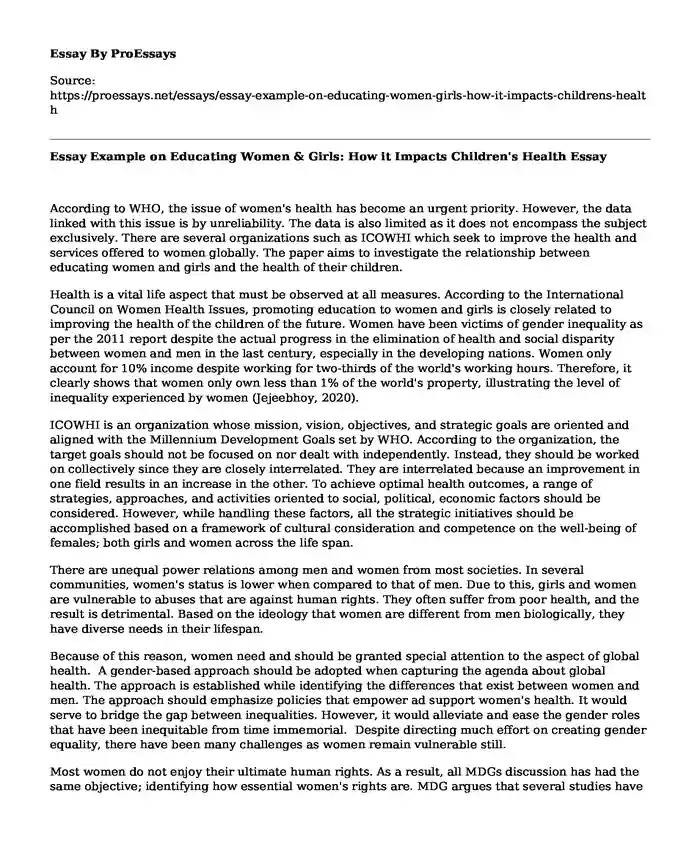According to WHO, the issue of women's health has become an urgent priority. However, the data linked with this issue is by unreliability. The data is also limited as it does not encompass the subject exclusively. There are several organizations such as ICOWHI which seek to improve the health and services offered to women globally. The paper aims to investigate the relationship between educating women and girls and the health of their children.
Health is a vital life aspect that must be observed at all measures. According to the International Council on Women Health Issues, promoting education to women and girls is closely related to improving the health of the children of the future. Women have been victims of gender inequality as per the 2011 report despite the actual progress in the elimination of health and social disparity between women and men in the last century, especially in the developing nations. Women only account for 10% income despite working for two-thirds of the world's working hours. Therefore, it clearly shows that women only own less than 1% of the world's property, illustrating the level of inequality experienced by women (Jejeebhoy, 2020).
ICOWHI is an organization whose mission, vision, objectives, and strategic goals are oriented and aligned with the Millennium Development Goals set by WHO. According to the organization, the target goals should not be focused on nor dealt with independently. Instead, they should be worked on collectively since they are closely interrelated. They are interrelated because an improvement in one field results in an increase in the other. To achieve optimal health outcomes, a range of strategies, approaches, and activities oriented to social, political, economic factors should be considered. However, while handling these factors, all the strategic initiatives should be accomplished based on a framework of cultural consideration and competence on the well-being of females; both girls and women across the life span.
There are unequal power relations among men and women from most societies. In several communities, women's status is lower when compared to that of men. Due to this, girls and women are vulnerable to abuses that are against human rights. They often suffer from poor health, and the result is detrimental. Based on the ideology that women are different from men biologically, they have diverse needs in their lifespan.
Because of this reason, women need and should be granted special attention to the aspect of global health. A gender-based approach should be adopted when capturing the agenda about global health. The approach is established while identifying the differences that exist between women and men. The approach should emphasize policies that empower ad support women's health. It would serve to bridge the gap between inequalities. However, it would alleviate and ease the gender roles that have been inequitable from time immemorial. Despite directing much effort on creating gender equality, there have been many challenges as women remain vulnerable still.
Most women do not enjoy their ultimate human rights. As a result, all MDGs discussion has had the same objective; identifying how essential women's rights are. MDG argues that several studies have proved that gender equality has innumerable benefits. Some of them are poverty reduction having sustainable growth in society.
Conclusion
Women and girls are likely to have less education, especially in developing countries, which is highly associated with poor health standards among women. Impoverishment in the society equates to marginalization and disempowerment alongside hunger and sickness. If emphasis can be made on how education can be offered to women and girls, it will raise social health awareness in the community hence creating a defined path for future health safety measures in the forthcoming generations. Health in society can only be achieved by eliminating all stressors to personal awareness of health safety. Therefore, there is a close correlation between educating women and girls and health to their children.
Reference
Jejeebhoy, S. J. (2020). Women's education, autonomy, and reproductive behavior: Experience from developing countries. OUP Catalogue. https://ideas.repec.org/b/oxp/obooks/9780198290339.html
Cite this page
Essay Example on Educating Women & Girls: How it Impacts Children's Health. (2023, Oct 27). Retrieved from https://proessays.net/essays/essay-example-on-educating-women-girls-how-it-impacts-childrens-health
If you are the original author of this essay and no longer wish to have it published on the ProEssays website, please click below to request its removal:
- Research Paper on Addiction Problem and Preventive Efforts
- Paper Example on Best Practice in NAEYC Program Standards
- Student Observing a Bus Paper Example
- Essay Example on Walking On Fire: The Women of Haiti and Their Fight for Justice
- Essay Sample on Exploring Autism at a Preschool Setting
- Niger: Terror, Displacement, and Colonial Borders in the Sahel - Research Paper
- Essay Example on Reimagining Arts & Society: The Bauhaus Model of Pedagogy







